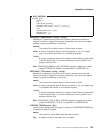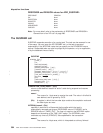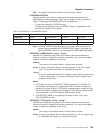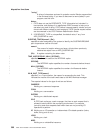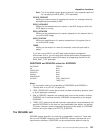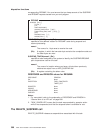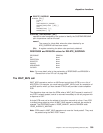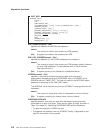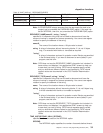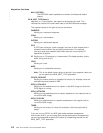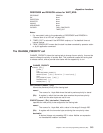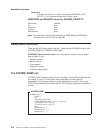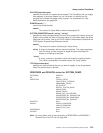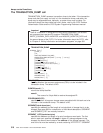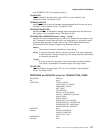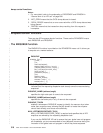
Table 15. WAIT_MVS call - RESPONSE(PURGED)
REASON TASK_CANCELLED TIMED_OUT
CONDITION PURGE FORCEPURGE DTIMOUT INTERVAL
PURGEABLE (NO) Canceled Proceeds normally Canceled Proceeds normally
PURGEABLE (YES) Proceeds normally Proceeds normally Proceeds normally Proceeds normally
Note: A FORCEPURGE always assumes that the user wants the task to be
purged, and so overrides the PURGEABLE(NO) option. If the user has
set an INTERVAL, then this, too, overrides the PURGEABLE(NO) option.
RESOURCE_NAME(name16 | string | "string")
specifies a 16-character string that can be used to document and trace the
resource involved in suspend and resume processing. You cannot use register
notation to specify the address of the string.
name16
The name of the location where a 16-byte value is stored.
string A string of characters without intervening blanks; if it is not 16 bytes
long, it is extended with blanks or truncated as required.
"string"
A string of characters enclosed in quotation marks. Blanks are permitted
in the enclosed string. If you want to document a name (label) in your
program, use this form.
Note: CICS does not use the RESOURCE_NAME information but includes it in
trace entries, and displays it on appropriate CEMT screens to help you
to see what your task is doing. CICS internal requests specify values,
and you should use different values to avoid ambiguity. CICS internal
request values are documented in the
CICS Problem Determination
Guide
.
RESOURCE_TYPE(name8 | string | "string")
specifies an 8-character string that can be used to document and trace the
resource involved in suspend and resume processing. You cannot use register
notation to specify the address of the string.
name The name of the location where an 8-byte value is stored.
string A string of characters without intervening blanks; if it is not 8 bytes long,
it will be extended with blanks or truncated as required.
"string"
A string of characters enclosed in quotation marks. Blanks are permitted
in the enclosed string. If you want to document a name (label) in your
program, use this form.
Note: CICS does not use the RESOURCE_TYPE information but includes it in
trace entries, and displays it on appropriate CEMT screens to help you
to see what your task is doing. CICS internal requests specify values,
and you should use different values to avoid ambiguity. CICS internal
request values are documented in the
CICS Problem Determination
Guide
.
TIME_UNIT(SECOND | MILLI_SECOND)
specifies the time unit used on the INTERVAL option.
SECOND
The INTERVAL option specifies the number of seconds before timeout.
dispatcher functions
Chapter 3. The user exit programming interface (XPI) 311
|
|
|
|
|
|
|
|
|
|



